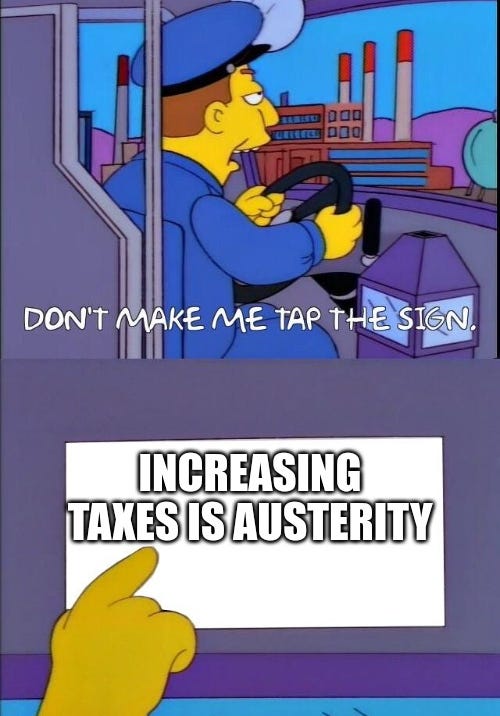No Return to Austerity?
In the lead up to Rachel Reeves’ first Budget at the end of the month there will no doubt be calls from commentators that there ‘should be no return to austerity’. We have already seen this from people within the Labour Party and also journalists. I do not take issue with this. What I have a problem with is the definition people use. They almost always define austerity in terms of spending cuts alone. While it is true that spending cuts are a form of austerity, so are tax rises but this is almost always never mentioned. In fact, you often see commentators say things such as ‘The Chancellor will have to raise taxes in order to avoid a return to austerity’. This is economic nonsense and it seems as though the vast majority of people don’t realise it.
In this short post I’ll make the case that tax rises are not only a form of austerity, but they are actually the most damaging form of austerity.
Increasing taxes in order to reduce the national debt and the deficit was traditionally seen as a form of austerity. For example, the Coalition government in the UK did implement austerity – and this is still controversial – the fact that tax increase formed part of those measures was not controversial. While people do remember many of the harsh cuts to government spending, they tend to forget that George Osborne also increased the standard rate of VAT from 17.5 per cent to its current level of 20 per cent. In fact, he also tried to levy VAT on certain takeaway food but was thwarted by Big Pasty (possibly the second most powerful lobby group in the country after the NFU).
If a measure is introduced to reduce the national debt or the deficit whether it be cuts to public spending or increasing taxes then it is a form of austerity. Moreover, even if the stated aim is not explicitly to reduce the deficit or the national debt, increasing taxes to fund public spending is still a form of austerity because the reason for doing it is to reduce the government’s reliance on borrowing to fund its spending.
There is obviously a debate to be had about the merits of austerity in general and the relative merits of various tax measures which goes beyond the scope of this blog post (you can read some of my views on tax measures here). However, my view on the Coalition government is that it really fumbled the bag and implemented a bizarre, economically damaging, and cruel form of austerity. It was a toxic combination of cuts to investment and support for vulnerable people, short term thinking, and tax increases was the worst way to go about things.
The government was right to be concerned about the scale of borrowing it had become reliant upon. However, it should not have tried to reduce the deficit by increasing taxes, reducing investment, or cutting support for the most vulnerable. For political reasons it did all three which was both cruel and bonkers.
If a government is determined to go for growth while also eliminating the deficit and lowering the national debt then having tax increases as part of that just does not work. An excellent book published in 2019 looked at the austerity measures of various governments throughout history and concluded that spending cuts have much smaller costs in terms of output losses than tax increases. They also show that spending cuts are much more successful than tax increases at reducing the growth of debt, and can sometimes even result in output gains, such as in the case of expansionary austerity. So, if a government does want to implement austerity measures while not also crashing the economy then it should not increase taxes.
I am not arguing for austerity but if I had been advising the Chancellor back in the Coalition years I would have recommended that the focus should have been to actually think about what the government should and shouldn’t try to do in order to identify spending cuts while protecting the most vulnerable and taking advantage of historically low interest rates in order to fund investments which would boost growth. What is more, there should have been sweeping reforms to the tax system rather than tax increases.
We shall see what the government does at the end of the month. I have written an opinion piece on why the government is right to change the Fiscal Rules in order to allow for some more borrowing to fund investment but needs to be careful about which target it adopts and remember that borrowing is not free money (I will obviously share this once it’s out).
Whatever the new Chancellor does, she – and anyone commenting on the Budget – need to remember that tax rises are a form of austerity.



